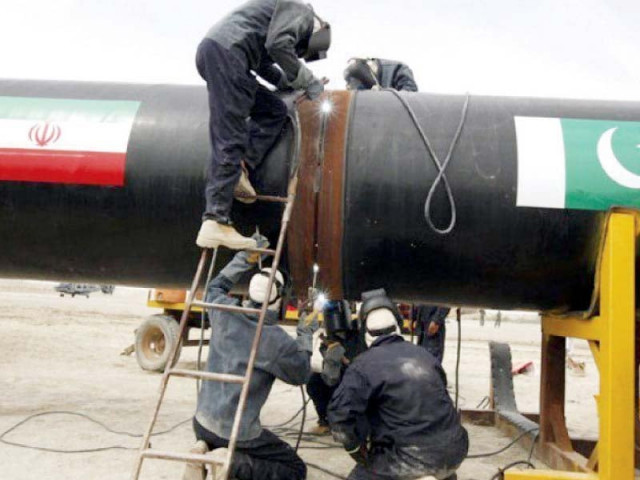IP pipeline still faces some sanctions, says Abbasi
Says if Pakistan kicks off work on project today, it will end in 2018

Pakistan was serious about finishing work on the long-awaited pipeline, which would bring 750 million cubic feet of gas per day (mmcfd) and cost $2 billion, said the minister. PHOTO: REUTERS
Petroleum and Natural Resources Minister Shahid Khaqan Abbasi told a parliamentary panel on Friday that the Iran-Pakistan (IP) gas pipeline project was on agenda of the Iranian president’s visit, but it still faced some restrictions.
Briefing the Senate Standing Committee on Petroleum and Natural Resources headed by Senator Talha Mehmood, Abbasi said so far no work on the IP pipeline could be started because of international sanctions on Iran, most of which have now been lifted.
Pakistan to trade with Iran in euros
The project is expected to be taken up during President Hasan Rouhani’s current visit to Pakistan, but the minister believes the pipeline is still facing some sanctions.
He stressed that Pakistan was serious about finishing work on the long-awaited pipeline, which would bring 750 million cubic feet of gas per day (mmcfd) and cost $2 billion. “If we kick off work today, it will come to an end in 2018,” he said.
Abbasi made it clear that no gas pipeline project including the liquefied natural gas (LNG) pipeline formed part of the China-Pakistan Economic Corridor (CPEC). Though China will construct an LNG pipeline from Gwadar to Nawabshah with a capacity to carry up to 1.2 billion cubic feet per day (bcfd), it is not part of the CEPC.
Russia will also build an LNG pipeline from Karachi to Lahore costing $2 billion on build, operate and transfer basis. In this regard, Islamabad and Moscow have signed an agreement and at present negotiations are under way for a commercial pact.
Abbasi pointed out that the Ministry of Petroleum had allocated 100 mmcfd of gas to Khyber-Pakhtunkhwa for power production, adding 24 LNG-based power plants would be developed in four years.
Vacant posts at PSO
The Senate committee was informed that 215 positions were vacant at Pakistan State Oil (PSO) and to fill these vacancies the management had issued advertisements in the national media. The hiring process is expected to be completed in the next six months.
The committee directed the PSO management to provide province-wise details of its employees and stop appointments on the advertised slots for the time being so that provincial quota could be met.
Iran-Pakistan gas pipeline under shadow of politics
Committee members expressed anger over the failure of PSO management to regularise the services of employees from Balochistan, who were brought as trainees in 2013 for a period of two years with a commitment to making them permanent employees after the completion of training.
PSO assured the committee that services of all these trainees would be regularised soon and the current strength of company employees was 2,285.
According to PSO, it has 50-day stock of high-speed diesel and furnace oil whereas motor sprit (petrol) can last eight days. PSO was trying to enhance the storage capacity, it said.
The committee was told that power producers had to clear dues amounting to Rs130 billion, accumulated since 2015, owed to the fuel marketing company.
Officials of Sui Northern Gas Pipelines Limited said the company had laid pipelines over 1,812 kilometres out of a total of 2,798 km in the past three years in Khyber-Pakhtunkhwa and the rest would be built in six months.
Director General Petroleum Concessions Saeedullah Shah said Hungarian exploration firm MOL was all set to explore oil and gas in tribal areas that had a significant potential.
Iranian president to visit Islamabad to push for IP gas pipeline project
At present, gas production in the country stood at 4.16 bcfd compared to the demand for 8 bcfd, he said, adding in the past three months exploration and production companies had made oil and gas finds, but the connection of these wells with the distribution pipelines would take time.
Published in The Express Tribune, March 26th, 2016.
Like Business on Facebook, follow @TribuneBiz on Twitter to stay informed and join in the conversation.



















COMMENTS
Comments are moderated and generally will be posted if they are on-topic and not abusive.
For more information, please see our Comments FAQ